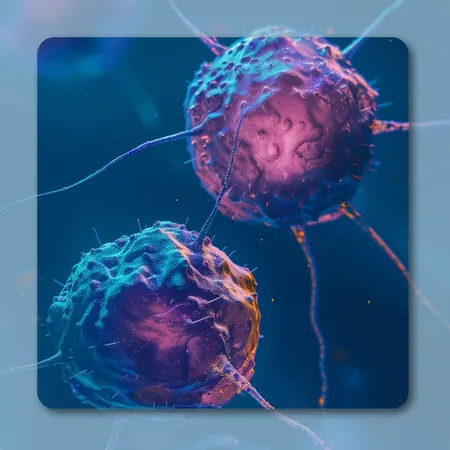
Groundbreaking Research: Mesenchymal Stromal Cells Could Pave the Way for Preventing Chronic Dry Mouth Caused by Radiation Therapy!
2024-11-08
Author: Siti
Introduction to Chronic Dry Mouth
Chronic dry mouth, scientifically known as xerostomia, is one of the most debilitating long-term side effects faced by patients undergoing radiation therapy for head and neck cancers. This condition stems from two main issues: a decrease in saliva production (hyposalivation) and alterations in the composition of saliva (salivary dysfunction). The repercussions of radiation-induced xerostomia (RIX) are severe and can lead to dental decay, difficulties in swallowing, a loss of taste, and challenges in communication. For many patients, these complications can drastically diminish their overall quality of life.
Statistics on Radiation-Induced Xerostomia
Staggeringly, older techniques like 3D conformal radiation therapy have shown that up to 80% of patients suffer from long-lasting dry mouth, while even newer methods, such as intensity-modulated radiation therapy, still leave over 40% of patients with RIX. The damage from radiation primarily targets the acinar cells in salivary glands, leading to fibrosis and impaired function. Unfortunately, current treatment methods including increased water intake and the use of salivary substitutes only provide minimal relief, underscoring an urgent need for more effective therapies.
The Promise of Mesenchymal Stromal Cells (MSCs)
Enter mesenchymal stromal cells (MSCs)—derived from sources like bone marrow and adipose tissue—these cells have exhibited promising results in promoting tissue healing across various injuries. Their effectiveness is attributed to their unique ability to secrete morphogens that foster tissue repair and exert significant immunomodulatory effects. Initial studies in animal models reveal that injecting MSCs into the salivary glands can boost saliva production by 30% to 50%, showcasing their potential in treating RIX.
Recent Clinical Trials and Innovations
Recent trials conducted in Denmark have opened avenues for using both autologous (a patient's own) and allogeneic (donor) MSCs in clinical settings, revealing potential benefits in restoring salivary function in patients with RIX. Building on this momentum, researchers at the University of Wisconsin have initiated pilot trials focusing on the use of a patient's own bone marrow-derived MSCs for those who have completed radiation therapy.
Challenges and Solutions
However, hurdles remain. While Danish clinical trials have shown promising results, the need to cultivate MSCs from liposuction raises issues concerning the practicality of widespread use. Additionally, the possibility of requiring repeated MSC injections adds complexity, as it could necessitate harvesting procedures each time or managing cryopreserved MSCs.
Innovative Approaches to MSC Utilization
The innovative solution proposed? Preactivation of cryopreserved MSCs using interferon gamma and tumor necrosis factor-alpha before reintroducing them into patients. Notably, harvesting MSCs from minor salivary glands through a simple and minimally invasive biopsy offers an appealing alternative to traditional extraction methods, which often come with their own set of risks and complications.
Upcoming Clinical Trial
Currently, no research has aimed at preventing chronic RIX before fibrotic damage occurs. To address this, a new clinical trial is in the works, aiming to test whether injecting specialized MSCs into the salivary glands after radiation therapy can stave off chronic xerostomia in newly diagnosed head and neck cancer patients. Participants will undergo a minor salivary gland biopsy prior to their treatment, followed by standard radiation protocol. After three months, provided there are no signs of remaining cancer, these patients will receive injections of the MSCs they produced.
Conclusion and Future Directions
This groundbreaking trial will be the first to explore the role of prelicensed MSCs in preventing chronic radiation side effects—promising a future where fewer patients suffer from the debilitating effects of dry mouth post-treatment. As research progresses, the hope is to transform the lives of those affected by such a common yet distressing condition. Stay tuned, as these developments could mark a significant step forward in cancer care and recovery!


 Brasil (PT)
Brasil (PT)
 Canada (EN)
Canada (EN)
 Chile (ES)
Chile (ES)
 España (ES)
España (ES)
 France (FR)
France (FR)
 Hong Kong (EN)
Hong Kong (EN)
 Italia (IT)
Italia (IT)
 日本 (JA)
日本 (JA)
 Magyarország (HU)
Magyarország (HU)
 Norge (NO)
Norge (NO)
 Polska (PL)
Polska (PL)
 Schweiz (DE)
Schweiz (DE)
 Singapore (EN)
Singapore (EN)
 Sverige (SV)
Sverige (SV)
 Suomi (FI)
Suomi (FI)
 Türkiye (TR)
Türkiye (TR)